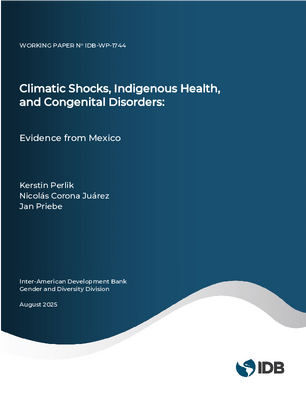Climatic Shocks, Indigenous Health, and Congenital Disorders: Evidence from Mexico
Date issued
Aug 2025
Subject
Health;
Drought;
Climate Change;
Productivity Shock;
Indigenous People;
Children;
Population Aging;
Maternal Health
JEL code
I14 - Health and Inequality;
I31 - General Welfare, Well-Being;
Q54 - Climate • Natural Disasters and Their Management • Global Warming
Country
Mexico
Category
Working Papers
Congenital disorders are a principal cause of early mortality, long-term disabilities, impaired cognitive development and constitute a major challenge to families, communities, and health care systems. The origins of congenital disorders are, however, not yet well understood. Using a high-dimensional fixed-effects model that includes municipality specific time and locality-by-month fixed effects, this study provides the first causal evidence on the role of high ambient temperature during pregnancy in affecting the onset of congenital disorders. We compiled a large dataset comprising about 19 million births from about 63,000 Mexican localities during 20082021 and connect it with local temperature data. We estimate that a 1C increase in the average monthly maximum temperature during gestation is associated with a rise in the incidence of congenital disorders by 2.4 percent (0.022 percentage points). Furthermore, we provide suggestive evidence that newborns from indigenous mothers are more likely to develop congenital birth disorders compared to children from non-indigenous parents when exposed to high ambient temperatures.
NO


